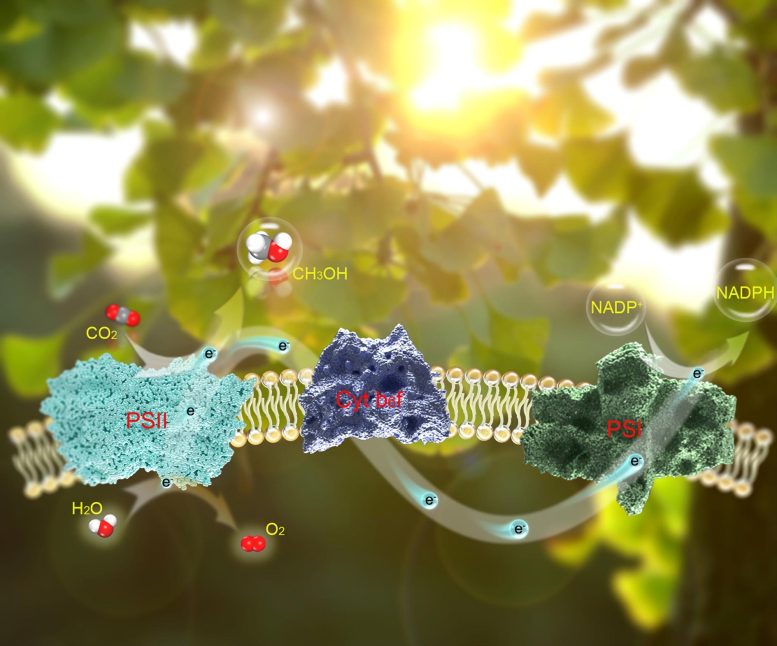
Photosynthesis is the greatest natural process on Earth. It has been widely accepted that CO2 assimilation takes place in light-independent reactions, for example, through the Calvin-Benson Cycle in the stroma. Here, an unusual light-driven CO2 assimilation (into methanol) by the PSII core complex in photosynthesis was reported. The extraordinary finding is likely to be a simultaneous event along with the usual electron transfer occurring in normal light-independent assimilation. Credit: Chinese Journal of Catalysis
Light-Driven CO2 Assimilation by Photosystem II and Its Relation to Photosynthesis
Photosynthesis is the greatest natural process converting sunlight into chemical energy on a massive scale and maintaining life on Earth. There are basically two successive stages of oxygenic photosynthesis, of which the light-dependent reactions in photosystem II (PSII), and in photosystem I (PSI), enable the oxidation of H2O into molecular oxygen, and production of reducing power (NADPH and ATP), while CO2 assimilation is generally known to take place long after oxygen evolution and NADP+ reduction, via light-independent reactions in the stroma.
Meanwhile, there is wide consensus that during light-dependent reactions CO2 (or bicarbonate) is not reduced as a substrate, but plays a unique stimulatory role in O2 evolution, namely the so-called “bicarbonate effect.” The role of bicarbonate effect as well as the bicarbonate binding sites in PSII have been intensively studied since the 1970s, with some important conclusions reached thus far. However, CO2 (or bicarbonate) in PSII is thought to only play supporting roles during water oxidation, rather than being “assimilated” by PSII.
Recently, a team of researchers, for the first time, reported a light-driven CO2 assimilation by PSII core complex, where the formation of methanol (CH3OH), along with the oxygen evolution, is validated by in-situ mass spectrometry, gas chromatography, and isotopic labeling experiments.
The team included scientists from Dalian University of Technology, Dalian Institute of Chemical Physics, Chinese Academy of Sciences, China, and the University of Illinois at Urbana-Champaign, USA.
Such an unusual CO2 assimilation is likely to be a simultaneous event along with the usual electron transfer occurring in normal light-independent assimilation. This discovery is extraordinary and is of great significance as it may substantially modify our understanding of the mechanism of photosynthesis. The results were published in the Chinese Journal of Catalysis.
References: “Light-driven CO2 assimilation by photosystem II and its relation to photosynthesis” by Yuehui Li, Duanhui Si, Wangyin Wang, Song Xue, Wenzhe Shang, Zhanyou Chi, Can Li, Ce Hao, Govindjee Govindjee and Yantao Shi, 2 December 2022, Chinese Journal of Catalysis.
DOI: 10.1016/S1872-2067(22)64170-6


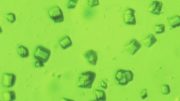
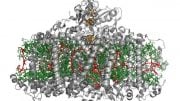

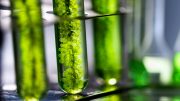

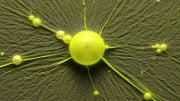
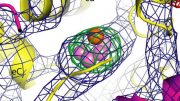
Wow. Thanks for not stating that in language the rest of us who are not biologists can understand. I’m glad not to be burdened with understanding. Being clear as mud is so refreshing. Who needs understanding? Let me tell you, not this guy.
To add to my comment above, this link on writing scientific papers may help:
https://youtu.be/vtIzMaLkCaM
This kind of photosynthesis procrss is favoured by a constrained background of nature,as when photodisease in plants are present.
I laughed so hard at your comment, Corey.
The part of the article that came through loud and clear was the word “extraordinary”. It made me suspicious that it wasn’t actually extraordinary. Maybe it IS extraordinary? I hope it’s extraordinary. That would be exciting, as well as extraordinary!